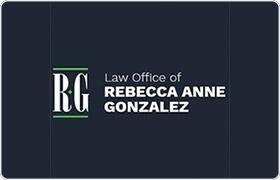Hondo Divorce & Family Law Lawyer, Texas
Sponsored Law Firm
-
 x
x

Click For More Info:
-
Law Office of Rebecca Anne Gonzalez
10101 Reunion Place Suite 615 San Antonio, TX 78216» view mapDivorce & Family Law Continuing The Gonzalez Legacy
At the Law Office of Rebecca Anne Gonzalez, my goal is to make certain you feel taken care of. My team and I work hard to protect what is important to you.
800-735-1530
Anton Ernest Hackebeil
Commercial Real Estate, Oil & Gas, Family Law, Criminal
Status: In Good Standing Licensed: 42 Years
Chris Randal Schuchart
Commercial Real Estate, Real Estate, Family Law
Status: In Good Standing Licensed: 28 Years
 Rebecca Gonzalez San Antonio, TX
Rebecca Gonzalez San Antonio, TX Practice AreasExpertise
Practice AreasExpertise
